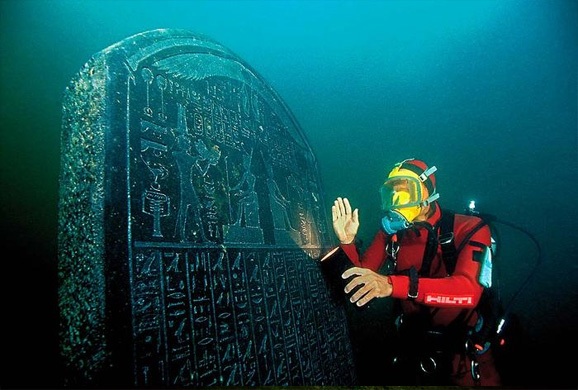It looks like you're using an Ad Blocker.
Please white-list or disable AboveTopSecret.com in your ad-blocking tool.
Thank you.
Some features of ATS will be disabled while you continue to use an ad-blocker.
share:
Not sure if this has been posted yet. Tried the search box but it`s not working for me.
Here it goe anyway but mods please remove if it has been posted already.
www.sunnyskyz.com...
Amazing statues and artifacts.
Wonder how much more information this can bring about the egyptian past.
They even found Aladin`s lamp, lol
EDIT: ANOTHER AND MUCH BETTER SOURCE HERE: www.telegraph.co.uk...
Here it goe anyway but mods please remove if it has been posted already.
The city of Heracleion was engulfed underwater 1500 years ago. This grand city had been mentioned by the Greek writer Herodotus, the 5th-century BC historian. He had told a wonderful tale of Helen of Troy, who traveled to Heracleion, then a port of 'great wealth', with her Trojan lover, Paris.
When French marine archaeologist Franck Goddio stumbled upon some relics, it led them to one of the greatest finds of the 21st century; a city underwater. The discovery took place when Goddio had been in search of Napoleon’s warships from the 1798 Battle of the Nile, when he had been defeated by Nelson in these very waters, but to his surprise, he stumbled upon this magnificent discovery.
www.sunnyskyz.com...
Amazing statues and artifacts.
Wonder how much more information this can bring about the egyptian past.
They even found Aladin`s lamp, lol
edit on 6-12-2013 by CosmicDude because: (no reason given)
EDIT: ANOTHER AND MUCH BETTER SOURCE HERE: www.telegraph.co.uk...
edit on
6-12-2013 by CosmicDude because: (no reason given)
reply to post by CosmicDude
Calling Slayer! lol.
What a magnificient find. An unidentified Egyptian Pharaoh? An inscribed pillar? It will take years to comb this site, and glean the history from it. It will probably change at least some of what we think we know about Egypt, and its people. I'll bet there are some excited archaeologists and Egyptologists right about now. S&F.
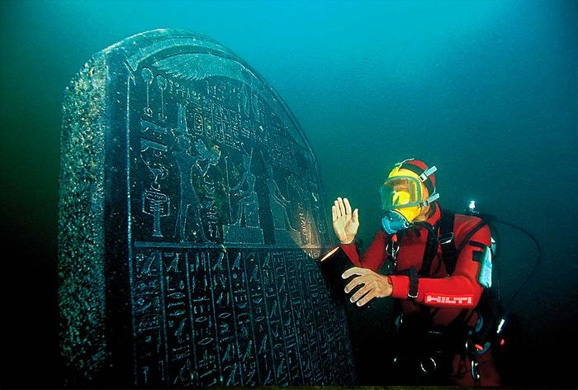
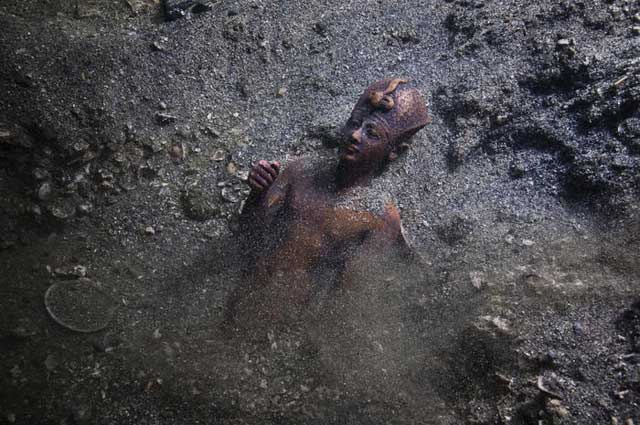
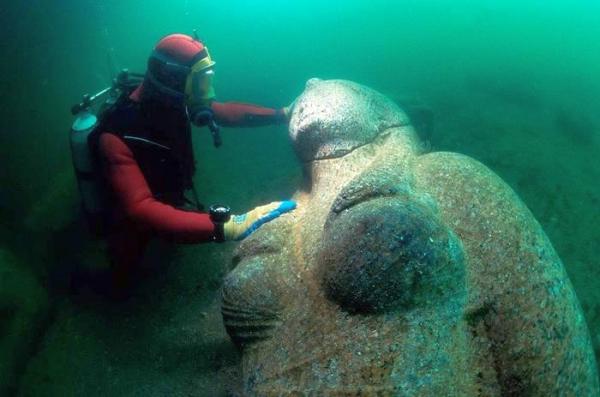
and of course, the lamp.
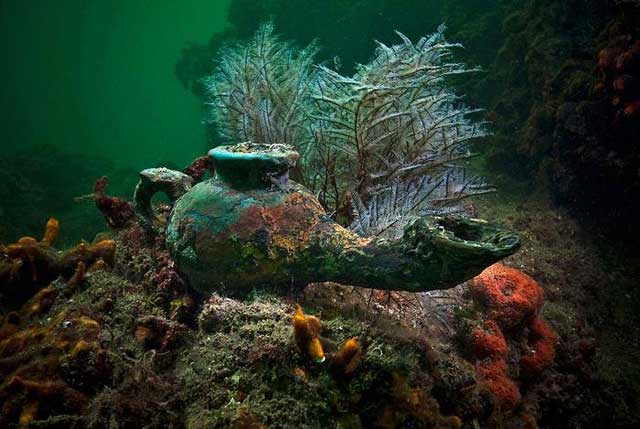
I'm wondering what that is they're piecing back together.
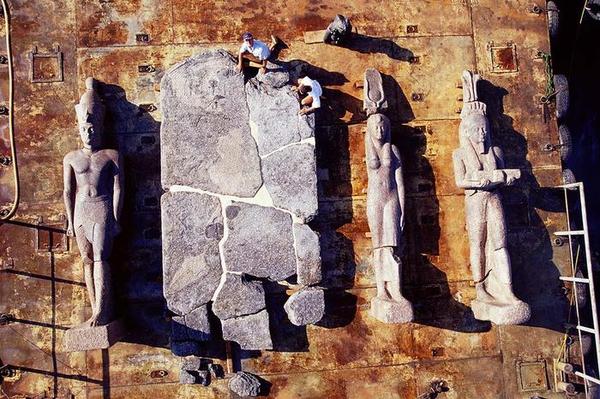
Calling Slayer! lol.
What a magnificient find. An unidentified Egyptian Pharaoh? An inscribed pillar? It will take years to comb this site, and glean the history from it. It will probably change at least some of what we think we know about Egypt, and its people. I'll bet there are some excited archaeologists and Egyptologists right about now. S&F.



and of course, the lamp.

I'm wondering what that is they're piecing back together.

edit on 12/6/2013 by Klassified because: eta
edit on 12/6/2013 by Klassified because: eta2
reply to post by Klassified
Wish I could bring the pictures to the thread but nothing working for me at the moment, not sure why ?!?! ...Can`t use the search box, neither upload photos
EDIT: Thank you so much for posting the photos my friend
Wish I could bring the pictures to the thread but nothing working for me at the moment, not sure why ?!?! ...Can`t use the search box, neither upload photos
EDIT: Thank you so much for posting the photos my friend
edit on 6-12-2013 by CosmicDude because: (no reason given)
Wow! This is very cool,and obviously tells that the stories of this city are true!! now if we could only find Atlantis.....
reply to post by CosmicDude

That is pretty awesome!

That is pretty awesome!
edit on 6-12-2013 by Akragon because: (no reason given)
Absolutely awesome! This makes you wonder all the more what else have we not discovered? I think we always make the mistake of assuming we know
everything about everything then something like this pops up to whet your appetite and imagination for more.
There is no telling what else lies within our waters or under our soil just waiting to be discovered. I look forward to the day when we come upon something akin to a "Grey" civilization. Something completely NOT human, but intelligent.
One can always dream. Thanks for this OP. S&F It's like an Egyptian Atlantis!
ETA - Am I the only one who has watched too much TV and always wonders if we should be removing/moving things like this? In the movies the removal of these statues would be akin to opening a portal to hell.
Yes. My imagination is off the charts.
There is no telling what else lies within our waters or under our soil just waiting to be discovered. I look forward to the day when we come upon something akin to a "Grey" civilization. Something completely NOT human, but intelligent.
One can always dream. Thanks for this OP. S&F It's like an Egyptian Atlantis!
ETA - Am I the only one who has watched too much TV and always wonders if we should be removing/moving things like this? In the movies the removal of these statues would be akin to opening a portal to hell.
Yes. My imagination is off the charts.
edit on 12/6/2013 by Kangaruex4Ewe because: (no reason given)
reply to post by CosmicDude
Very interesting find...SnF! I 'm looking forward to seeing the rest
of the treasure as well as the symbolism on that pillar. Can't imagine
what information is contained on the pillar. How exciting... Bloody awesome!
Cheers
Ektar
Very interesting find...SnF! I 'm looking forward to seeing the rest
of the treasure as well as the symbolism on that pillar. Can't imagine
what information is contained on the pillar. How exciting... Bloody awesome!
Cheers
Ektar
Much we dont know and understand about history.
Look forward to the documentary on this when it arrives.
Great find.
Look forward to the documentary on this when it arrives.
Great find.
I love this stuff! for those looking for further reading, here's a link to the discover's site with lots of pictures. This discovery actually goes
back to 2000!
Franck Goddio
Another lost and sunken Egyptian city, Aexandria, captured my imagination when I read about it a couple of years ago. There's a great in-depth article by the Smithsonian online.
Anyone see a good recent documentary on these finds? I'd love to see one.
Franck Goddio
Another lost and sunken Egyptian city, Aexandria, captured my imagination when I read about it a couple of years ago. There's a great in-depth article by the Smithsonian online.
But archaeologists have tended to give Alexandria the cold shoulder, preferring the more accessible temples of Greece and the rich tombs along the Nile. “There is nothing to hope for at Alexandria,” the English excavator D. G. Hogarth cautioned after a fruitless dig in the 1890s. “You classical archaeologists, who have found so much in Greece or in Asia Minor, forget this city.”
Hogarth was spectacularly wrong. Empereur and other scientists are now uncovering astonishing artifacts and rediscovering the architectural sublimity, economic muscle and intellectual dominance of an urban center that ranked second only to ancient Rome. What may be the world’s oldest surviving university complex has come to light, along with one of the Seven Wonders of the World, the Pharos, the 440-foot-high lighthouse that guided ships safely into the Great Harbour for nearly two millennia. And researchers in wet suits probing the harbor floor are mapping the old quays and the fabled royal quarter, including, just possibly, the palace of that most beguiling of all Alexandrians, Cleopatra. The discoveries are transforming vague legends about Alexandria into proof of its profound influence on the ancient world.
Read more: www.smithsonianmag.com...
Anyone see a good recent documentary on these finds? I'd love to see one.
reply to post by Klassified
Here's some more images and video I found here
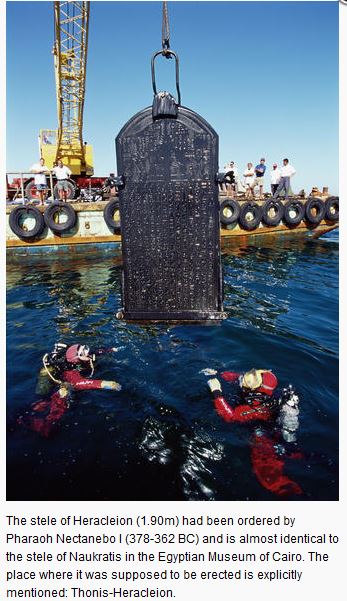
More images at the link above.
Here's some more images and video I found here

More images at the link above.
Rosinitiate
Can someone on here translate what it says?
It says...
Thou silly swimmer who findeth this rock...
Say cheese!
UMMM Wow stunning
O the lamp please dont rub it . Jinn were NOT blue guys with cute little songs .
They were Imprisiond Evil spirits and if relised would used there powers to try to decived .
Ps the point of that being in order for the jinn to be free from his prision he has to find someone to take his place. So poor aladian Gennie I wish I had Power .your wish is granted aladain .
Poof all the power of the univirse In a Ite bite living spaceb .And traped untill you find the next sucker to replace you.
Ps Wile edited for space this is basicly the REAL story of jinn dinn genies.
They were not nice spitirts so rub with causion.
O the lamp please dont rub it . Jinn were NOT blue guys with cute little songs .
They were Imprisiond Evil spirits and if relised would used there powers to try to decived .
Ps the point of that being in order for the jinn to be free from his prision he has to find someone to take his place. So poor aladian Gennie I wish I had Power .your wish is granted aladain .
Poof all the power of the univirse In a Ite bite living spaceb .And traped untill you find the next sucker to replace you.
Ps Wile edited for space this is basicly the REAL story of jinn dinn genies.
They were not nice spitirts so rub with causion.
reply to post by CosmicDude
I read your link. That is an awesome find. Something just didn't sit with me quite right though. You know that old saying "..if it looks to good to be true.."? Maybe my lack of knowledge, but I would think that all of those artifacts being underwater for 1500+ years would have some sort of 'Mother Nature' growing on them.
The bird's eye view of the statues and what appears to be a section of wall on the barge deck. I'm assuming the wall failed at some point, so how did they retrieve that large of a section without breaking the mortar joints? Very clean mortar joints I might add.
The gylphs on that wall underwater. It looks like a scholar had just chiseled them out yesterday.
Also, the gold pan, gold was worth as much then, as it is now. Were they in a hurry to leave and couldn't return?
Your link looks to be a good source for information but it all looks too staged to me.
One last thing while I'm being so critical, I could have very well missed it but "Where's the '..History Changing..' part that's mentioned in the topic's title?
I read your link. That is an awesome find. Something just didn't sit with me quite right though. You know that old saying "..if it looks to good to be true.."? Maybe my lack of knowledge, but I would think that all of those artifacts being underwater for 1500+ years would have some sort of 'Mother Nature' growing on them.
The bird's eye view of the statues and what appears to be a section of wall on the barge deck. I'm assuming the wall failed at some point, so how did they retrieve that large of a section without breaking the mortar joints? Very clean mortar joints I might add.
The gylphs on that wall underwater. It looks like a scholar had just chiseled them out yesterday.
Also, the gold pan, gold was worth as much then, as it is now. Were they in a hurry to leave and couldn't return?
Your link looks to be a good source for information but it all looks too staged to me.
One last thing while I'm being so critical, I could have very well missed it but "Where's the '..History Changing..' part that's mentioned in the topic's title?
reply to post by Rosinitiate
I think it says: Bathroom is inside the kitchen, lol
Can`t wait they find out what it says
I think it says: Bathroom is inside the kitchen, lol
Can`t wait they find out what it says
So MSM with it's doom about sea level rising all comes from about 300 bc ...I wonder if the Egyptians blamed it on co2 or the gods .. nice
find op S&F
I see those broken statues under water and can't help but imagine how they must have broken. I think of how devastating it must have been for them
much like Sumatra but on a much higher scale. My heart weeps at the thought of their experience as the earth quaked and the pillars all began to fall.
Than the waves if you survived to that point.
A snap shot of the awesomeness and wrath of planet Earth. We should surely take heed.
A snap shot of the awesomeness and wrath of planet Earth. We should surely take heed.
I would love to see a map of where this was discovered. I think the question is, what cataclysmic event caused this to go to the bottom of the sea.
new topics
-
Meta Llama local AI system is scary good
Science & Technology: 2 hours ago -
This is why ALL illegals who live in the US must go
Social Issues and Civil Unrest: 4 hours ago -
UK Borders are NOT Secure!
Social Issues and Civil Unrest: 6 hours ago -
Former ‘GMA Producer’ Sues NPR-Legacy Media Exposed
Propaganda Mill: 7 hours ago -
New Footage - Randy Rhoads 1979 LIVE Guitar Solo Footage at the Whisky - Pro Shot
Music: 8 hours ago -
Happy Hanukkah…
General Chit Chat: 8 hours ago
top topics
-
This is why ALL illegals who live in the US must go
Social Issues and Civil Unrest: 4 hours ago, 12 flags -
Former ‘GMA Producer’ Sues NPR-Legacy Media Exposed
Propaganda Mill: 7 hours ago, 8 flags -
A Merry Christmas.
General Chit Chat: 16 hours ago, 7 flags -
Happy Hanukkah…
General Chit Chat: 8 hours ago, 7 flags -
UK Borders are NOT Secure!
Social Issues and Civil Unrest: 6 hours ago, 6 flags -
New Footage - Randy Rhoads 1979 LIVE Guitar Solo Footage at the Whisky - Pro Shot
Music: 8 hours ago, 5 flags -
Meta Llama local AI system is scary good
Science & Technology: 2 hours ago, 4 flags
active topics
-
Panamanian President-“every square meter” of the Panama Canal belongs to Panama.
New World Order • 46 • : fringeofthefringe -
Meta Llama local AI system is scary good
Science & Technology • 11 • : TzarChasm -
This is why ALL illegals who live in the US must go
Social Issues and Civil Unrest • 10 • : DAVID64 -
Orange County Makes Shoplifting a Felony
Other Current Events • 31 • : GENERAL EYES -
Happy Hanukkah…
General Chit Chat • 20 • : JJproductions -
NYPD arrests migrant who allegedly set woman on fire on subway train, watched her burn to death
Breaking Alternative News • 55 • : xuenchen -
Plane Crash Today --Azerbaijanian E190 passenger jet
Mainstream News • 36 • : Oldcarpy2 -
FAA Investigates Christmas Drone Show Gone Wrong in Orlando, FL 12/2024
Other Current Events • 11 • : ScottKirkland -
It's Offical Now
US Political Madness • 26 • : Oldcarpy2 -
This is an interesting picture. Do we actually pick our leaders?
Politicians & People • 13 • : GENERAL EYES

